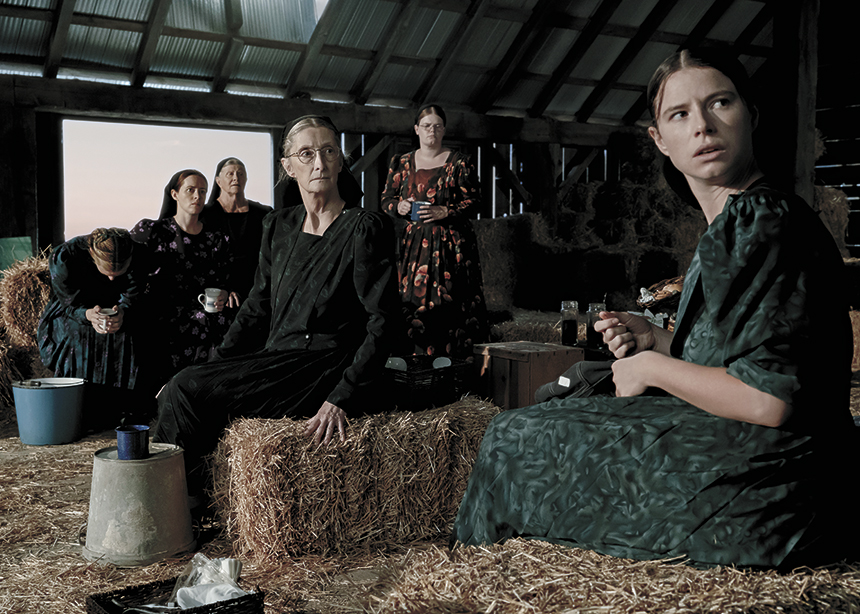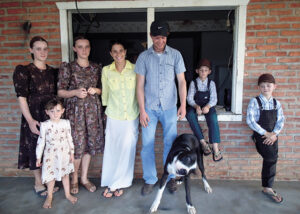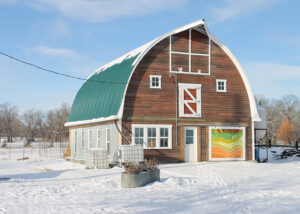What do we do when we are wronged: Nothing? Stay and fight? Or do we leave?
These questions form the backbone of Women Talking, a 2022 film directed by Sarah Polley and adapted from Miriam Toews’s acclaimed novel of the same name.
The plot is simple, though not easy: A group of women belonging to an ultraconservative religious community meets in a hayloft to discuss their options in response to the repeated assaults against them by numerous men in the colony. The men use livestock tranquilizer to incapacitate women and girls in their homes, and then rape them. Colony men suggest Satan is to blame and threaten excommunication if the women won’t forgive.
After the women democratically dismiss the option of doing nothing, most of the film then focuses on the debate between staying to fight or leaving. Because the women have been kept illiterate, they recruit August (played by Ben Whishaw), the resident ally and schoolteacher, to take minutes of their hayloft meeting. The film’s demure and supportive version of August is an improvement on his appointment as the narrator in the novel, telling the women’s stories second-hand.
The discussion is intercut with brief but visceral flashbacks of women realizing they had been raped: Ona (Rooney Mara) wakes up to bruises on her thighs and a fetus in her belly; Greta (Sheila McCarthy) wakes up to a bloody mouth full of broken teeth. Far from gratuitous, these short scenes underscore the grief and bewilderment the women feel. They make the rage of Salome (Claire Foy) and Mariche (Jessie Buckley), the clarity of Ona, and the wisdom of Agata (Judith Ivey), and Greta agonizingly palpable.
In one particularly gut-wrenching scene, we learn about the rape of Salome’s four-year-old daughter, Miep (Emily Mitchell). Salome almost relishes her assertion that, if she stays, she will commit murder. Calmly, Greta and Ona help her understand that staying in such an abusive situation, knowing that she craves vengeance, betrays her faith’s tenet of pacifism. She must leave to save her own soul.
The nature of forgiveness is at the film’s centre. The women ultimately decide that immediate forgiveness is impossible, especially knowing that their sons are being steeped in the same rhetoric of patriarchal power their fathers were. Nobody forces quick forgiveness. On the contrary, Ona is concerned that the “misuse of forgiveness” would confuse forgiving the men with giving them permission to continue their abuse. By the end, the film shows us that forgiveness is something to consider deeply.
While the protagonists are mainly women, August Winter plays Melvin, a young trans man. Melvin has been abused and impregnated by his brother. By the end, the women recognize that Melvin’s stake in the decision is just as valid as theirs.
The film avoids giving any of the colony’s men, besides August, screen time, but shows the boys in the colony.
While the film’s sombre grey aesthetic conveys the weight of its subject matter; its narrative also leaves room for women’s joy. There are sorrows aplenty, but there is also laughter, camaraderie and excitement. Deliberations are particularly lightened by Autje (Kate Hallett) and Neitje (Liv McNeil), who join the meetings as survivors, but also as girls who giggle and horse around out of boredom.
Foy and Buckley lead the astonishing ensemble cast. The production design is respectful and well-researched, and the cinematography features gorgeous wide shots of wide-open farmland, the colour unsaturated and evocative of a place out of time in a culture all its own.
Women Talking pulls the threads of sorrow, joy, anger and faith together to explore the nature of forgiveness and patriarchy, and the determination that these women matter enough to leave their abusers behind.
While Toews’s original story is linked to the “ghost rapes” at the Manitoba Colony in Bolivia more than a decade ago, the film never mentions Mennonites of any geographic location. Instead, Polley considers the film a “fable” and the plot diverges significantly from historical events.
Women Talking has been nominated for Best Picture and Best Adapted Screenplay at the 95th Academy Awards. It is now showing in select theatres.
Mandy Elliott is an assistant professor of English and film studies at Booth University College in Winnipeg, where she attends Hope Mennonite Church.

Five responses
Visceral
There’s lots that could be said about the story, the craft, the colour tones, setting, critique or praise of various characters, the connections to the original story of Mennonites in Bolivia—all things that I’ve encountered in reviews or Facebook discussions.
But I find myself disinterested in all that now, because this movie affected me on a visceral, rather than intellectual, level. I’m not even quite sure how to articulate it, except that it moved me beyond the specifics of that story into the universal, and thus the specifics of my own.
Not that I’ve ever experienced anything as brutal as the women in the movie or the originating events—I’ve been privileged in that sense for sure—but nevertheless I knew myself in their arguments, their anger, their mutual consolations, and, I hope, their courage. I think I saw myself in every face, though, being older, I especially loved the older women: Greta and Agate in the barn conversations, but also Scarface, who steps away from the conversation.
This is a movie that tackles true and hard things, like innocence and powerlessness and violence and forgiveness and God, and maybe it was powerful to me precisely because what the women want in the story is what I truly want as well: We want our children to be safe, we want to be steadfast in our faith, we want to think.
—Dora Dueck, novelist, Delta, B.C.
A larger truth
I appreciated the movie as a very sensitive artistic expression of the power of oppressed women joining together to resist patriarchal violence. I loved the different women and the unique perspective each brought to the conversation about whether to do nothing, stay and fight back, or leave. All the characters were wonderfully cast and acted. I thought the cinematography was exquisitely beautiful, especially the multiple scenes of children playing outdoors.
But what I appreciated most were the deep and nuanced conversations among the women about faith, forgiveness, complicity and love, and the women’s capacity to imagine a world where they are allowed to think and where their children are safe. I also liked the little touches of humour inserted here and there to lighten the tone.
When I first read Miriam Toews’s book, I was troubled by a sense of how unrealistic the whole scenario was. Could illiterate colony women talk in such sophisticated and seemingly educated ways? Would they actually recruit a male teacher to take minutes of their discussion? Would they really contemplate leaving their home and heading into the unknown en masse?
For whatever reason, the movie’s lack of “realism” did not bother me. There is a larger truth, and the movie speaks to that truth through its sensitive portrayal of women finding their voice and a faith-filled, nonviolent response to horrendous abuse.
—Esther Epp-Tiessen, researcher and writer, Winnipeg
Painful
I love Miriam Toews. I love her audacity, her wit, her willingness to look at the Mennonite experience as both an insider and outsider. It can be painful reading when her characters express things I can relate to as a Mennonite woman who grew up feeling like both insider and outsider.
On my mother’s side, we’re from a long line of Mennonites in the Netherlands. But when we immigrated to Canada, we had to explain again and again that just because we didn’t have the usual traditions—there’s no way we could play the Mennonite name game and my mother didn’t bake—we were still deeply and wholly Anabaptist. We don’t all ride in buggies, wear head coverings or live without electricity either. But some of us do.
When people find out I’m Mennonite, I’m asked the usual questions: “What did you think of the CBC series Pure?” “Have you seen Breaking Amish?” “Does Miriam Toews speak for all Mennonites?” I say that Miriam wrestles with themes of loneliness, oppression, mental illness and the search for independence, as many of us do.
The facts behind Women Talking are so shocking, so unbelievable, so violent, that I can hardly bear to think that it, too, is part of our Mennonite story. But I decided to see how the brave and honest Canadian filmmaker Sarah Polley would tell the story.
It was as painful as I imagined. But as I watched, I realized it was only partly a Mennonite story. In reality, it’s a story about patriarchy and oppression, of a closed community that forces everyone to stick to its rigid rules. This sort of story is not confined to Mennonite circles. It can happen whenever learning, growth and openness are strictly controlled, when leaders frown on change or new ways of discerning God’s will.
I pray that everyone who sees Women Talking will be moved not only by the story, but will find hope that there are people who ask hard questions about their futures and their communities, whoever or wherever they are, if they’re Mennonite or not.
—Marieke Meyer, former CBC radio producer, now working at Toronto United Mennonite Church
To bear witness
When the book Women Talking came out in 2018 to much acclaim, some critics asked whether Toews accurately represented colony Mennonites. In the preface, Toews tries to get in front of this criticism by saying the book is “a reaction in fiction” and “an act of female imagination.”
Sarah Polley’s film adaptation puts the “female imagination” line on the screen at the beginning. She further distances the film from real-life events: never is the word “Mennonite” used. Gone are most of the specifics of how the colony is structured. The head of the colony, Peters in the novel, is not named. Gone are the occasional Low-German phrases. Among other functions, these changes shift this story into a more allegorical realm. It becomes almost a parable.
And, since parables are meant to teach, we must ask ourselves what the film teaches. It provides a hope-filled vision of one possible reaction to systemic sexual violence in a patriarchal society.
The first step is listening to victims. Polley highlights this with one of the more significant departures from the novel. In Toews’s novel, we read the meeting minutes of August Epp, the one male allowed to sit in on the meetings. In the film, the narrator is Autje, one of the teenagers at the meetings. Autje tells the story to an unborn child. The story now comes directly from one of the victims. Autje is teaching this young one about their history. This theme of education is vital.
The action of the movie is the decision of the women on how to respond to the violence they suffer. In this, we also see and hear the various ways these women are affected by sexual violence. They sit with each other. They listen to each other’s pain, anger, sorrow and grief. They argue. They experience these things with each other, all grasping for ways to cope.
Some women recite Bible verses or sing beloved songs. Some smoke. Some have panic attacks. Some harden their hearts. Some throw their pain around indiscriminately, almost seeking to wound.
We bear witness to these women bearing witness to each other. The seemingly simple title, Women Talking, is shown to be deeply, beautifully complicated.
The women discuss safety for themselves and vulnerable members of their community. Unfortunately, it is not a straight line. Their final decision and final step are not really final at all. They will need to teach the next generation gentleness, humility, openness. The hope at the end of the film is that ways that have led to such harm can be unlearned.
If the colony in the film is to be understood as a real place, then this story becomes one of western ideals being presented as superior.
However, if read as an allegory or parable about how to respond to systemic sexual violence, Women Talking provides a beautiful and necessary example of what could be done.
—Adam Klassen Bartel, librarian at Westgate Mennonite Collegiate, Winnipeg
Room to imagine
In Women Talking, eight women imagine a new world for themselves and their families, a world where they can live without male violence and domination. This intergenerational group of women speak—angrily, defiantly, with care, with grief—while one man, August, records their words.
I’ve heard some viewers criticize the film for its lack of authenticity, that it’s difficult to believe the story because all the men, apart from August, are absent, but I think their absence is integral to Sarah Polley’s project. Women Talking is not an exploration of the evil actions of men. Polley isn’t interested in the nuanced perspectives the men of the colony may hold, nor does her film ask why the male villagers have learned to dehumanize and hate women.
I believe Polley centres women talking because she believes in the power and importance of their articulation. Their conversation, with all its dynamic disagreement, is the condition that makes hope and healing possible for them to imagine. These women have been “bruised and infected,” they have been “preyed upon like animals.” They have also been dismissed and doubted by the men in the colony—accused of fabricating their accounts of abuse, or of somehow deserving it as a form of demonic punishment.
Rather than aiming for verisimilitude, Women Talking is a work of “female imagination” that insists on creating a space in which women’s stories are listened to and believed.
—Sarah Ens, writer and editor, Winnipeg
Related stories:
What about the women of Manitoba Colony?
Barns and kerchiefs: The Mennonites behind the scenes of ‘Women Talking’
Editorial: Red carpet hayloft
For discussion
1. What are some of the complexities of faith and forgiveness in this story?
2. Do you know of examples of people being forced or coerced to forgive? In which circumstances has patriarchy been a problem among Mennonites?
3. If a work of fiction, such as Women Talking, is based on true events, how important is it that the details be accurate? Do the book and movie run the risk of misappropriating Mennonite culture?
4. What can the movie teach about closed communities with rigid rules? Are such communities destined to end in abuse?
5. What might the people of Manitoba Colony think about Women Talking?
—By Barb Draper
—Corrected Feb. 27, 2023. This article originally included an incorrect spelling of Esther Epp-Tiessen’s last name.











Leave a Reply
You must be logged in to post a comment.